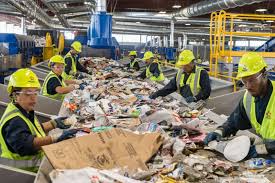Recycle Right, Now More Than Ever

By now you’ve probably heard of China’s impacts on US recycling markets through their more stringent recycled material standards. Due to increasing environmental awareness in China, they are cracking down on imports of scrap material by refusing contaminated loads and potentially banning certain materials outright. This program, called ‘The National Sword’, is a strong message to the United States to clean up the material stream. What does it mean for you? Keep recycling, but recycle right.
Here in Central Oregon, the mixed recyclables collected from your curb are baled up and sent to a Material Recovery Facility, where they are sorted. “MRF’s”, using machinery and people power, sort and separate what they can. Fans blow paper, magnets attract metals, and people pick through everything else along a conveyer belt that moves at a pretty good clip. These MRF’s are slowing down their lines so they can do a better job of removing contamination (like plastic bags). While this process slows down, the recyclables keep coming in at their regular rate. Because of this backlog and limited space, some MRFs have applied to Oregon DEQ to permit dumping their recyclables into a landfill for temporary relief. The Oregon Refuse & Recycling Association (ORRA) also issued a release and a fact sheet on what China’s actions mean for recycling, and Portland Metro has written about how the global market shift will change drop-off recycling in Portland.
If those facilities are granted permission by DEQ to landfill recyclables, it is still viewed as a temporary measure. Our recycling is still being baled locally and sent to the valley to a MRF for recycling, and we should continue to recycle, regardless of whether or not those permits are issued. However, what we should stop doing is putting things in there that don’t belong there.
Now is an opportunity to make sure your household, office, school and anywhere else you regularly go, are educated and up to speed about what can go in the bin. What is accepted here has not changed in a long time, but whether you are a wishful recycler or a new resident, everyone would benefit from a refresher. Here’s a quick break down:
- PLASTICS: Like we tell kids in our school presentations, “bottles tubs and jugs” can be recycled here. If it’s not one of those, it doesn’t go in your mixed recycling bin! It doesn’t matter if it has a recycling symbol on it – virtually all plastic products do, it just tells us what kind it is. (Check out more of our Recycling FAQ’s here).
- PAPER: Paper, paperboard and cardboard are recyclable. If it has to be lined with something to keep liquids in (or out), it can’t be recycled (picture that paper shredded up and continuing to repel water at a paper mill). Examples of unrecyclable paper include coffee cups, milk cartons, frozen food boxes, and most paper plates.
- METAL: Cans, pie plates, and clean tin foil are recyclable. All other scrap metal can be recycled at the landfill, but please don’t put it in your mixed recycle cart.
- GLASS: Yes, glass jars and bottles, but absolutely they must be in the separate container that is provided.
While recycling requires a lot of energy, it is still so so so much less then extracting virgin material from the earth to make new stuff. So yes, keep recycling. But recycle right. We have signs to help you. Then, go beyond recycling to waste prevention. It is much more important, from an environmental life cycle point of view, to be thinking not just about where something goes, but rather where it came from and all those associated impacts.
The most direct way we can take control of this is to do our weekly shopping with waste prevention in mind. Reuse bread bags to buy loose lettuce instead of a buying the lettuce mix in plastic containers. Use a cloth bag for apples so you can forgo the plastic molded 12-pack of apples. Weigh glass jars at the register before filling up on bulk items like grains. Use waxed cloth instead of plastic wrap to wrap leftovers. And keep your office, car, or bike pannier stocked with a coffee mug, a water bottle and a bag. Start with those and your recycling bin, and all the people who have to deal with it along the way, will thank you.
Nicely written article on recycling of plastic products.
Everyone should use paper bags instead of using plastic bags which are non decomposable and non degradable in soil.
Recycling plastics can be so tricky. This article was helpful.